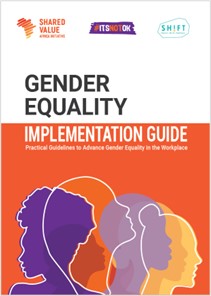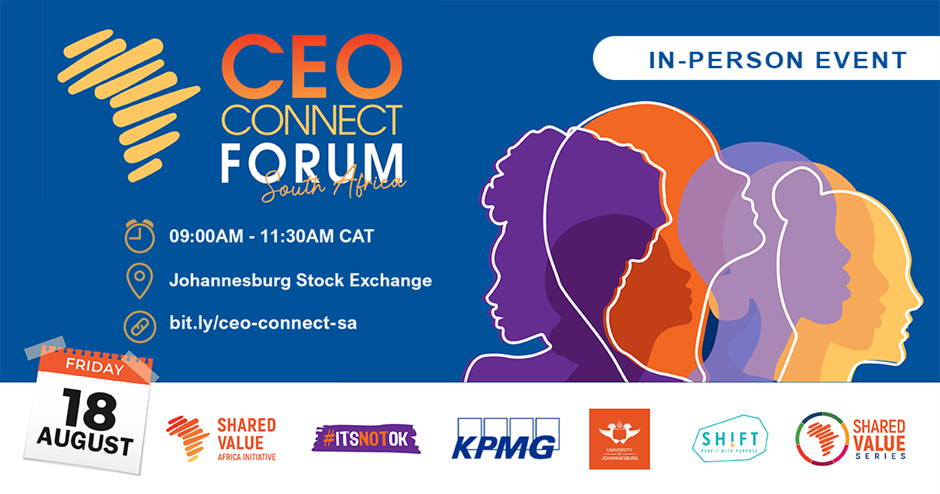Driving Gender Equality in Business
The Gender Equality Implementation Guide is not merely a part of the gender equality conversation, it is an active catalyst designed to spur real, tangible action towards achieving gender equality in workplaces across Africa.

On August 18, at the CEO Connect South Africa Forum a significant stride in the pursuit of Gender Equality will be made. Shift Impact Africa, Shared Value Africa Initiative (SVAI) and the GBVF #Itsnotok movement will be unveiling a vital tool in the struggle for gender equality: The Gender Equality Implementation Guide. Conceived by Shift Impact Africa Group, CEO Tiekie Barnard, and supported by a team of experts and advisors, the vision is that this tool will guide and help to propel gender equality in the workplace to the forefront and encourage substantial and meaningful action to bring about much needed change.
The quest for gender equality, a fundamental human right, has been long and challenging. Despite progress, it remains elusive, calling for urgent and intensified efforts to empower women and girls in all aspects of life. The concept of gender equality reaches beyond social and cultural rights, focusing also on economic, political, and structural opportunities.
Progress has been slow; gender inequality is deeply ingrained and systematic. According to the United Nations Sustainable Development Goals (SDGs), gender prejudice is a costly societal drawback, with the current pace of progress suggesting that it would take approximately 300 years to achieve gender equality.
Yet, the cost of inaction is high. Women perform 60% of global work but earn only 10% of the money and own a mere 1% of property. This systemic inequality hinders societal and economic growth. The McKinsey Global Institute’s report, “The Power of Parity,” illustrates this, stating that gender equality could add $12 – $28 trillion to the global GDP by 2025.
In Africa, the urgency for closing the gender gap is even more pronounced. Women bear most caregiving and household responsibilities, face high levels of violence, and often lack access to formal employment or policy influence. Research indicates that boosting women’s equality could increase Africa’s GDP by 10%, or US$316 billion, by 2025.
Given this background, the question arises: how can businesses take a proactive role in addressing gender inequality? The private sector is well-positioned to implement transformative changes through policies and practices promoting gender diversity, equal pay, supportive work environments, and accountability measures. By taking such steps, private businesses can contribute significantly to societal transformation and the achievement of SDGs.
In this context, the Gender Equality Implementation Guide serves as a critical resource, offering practical tools and guidance for businesses striving towards gender equality. The guide outlines the business case for gender equality and provides resources for implementing gender-sensitive strategies and monitoring progress.

Organisations that embrace gender equality often find themselves more innovative, profitable, and competitive. They enjoy enhanced market reputation, higher employee satisfaction, and reduced staff turnover, leading to overall business growth. Addressing gender-based violence and discrimination is not only ethically correct but also legally required, reducing potential legal liabilities and enhancing the overall well-being of staff.
By using the Gender Equality Implementation Guide as a guideline, businesses can work towards creating a more inclusive workplace, foster diversity and equity, and promote a culture of innovation and productivity. The guide provides a comprehensive framework, best practices, and resources for policy creation, communication strategies, and ongoing education. This ensures everyone in the organisation is equipped to promote equality.
In the final instance, gender equality and the prevention of violence, discrimination, and oppression are not only moral obligations but also business imperatives. It is time for the corporate world to take active steps in championing gender equality, not just as a social justice mandate, but also as a key to unlocking human potential and societal progress.
We invite all corporate leaders to join us at the CEO Connect South Africa Forum, which takes place at the Johannesburg Stock Exchange, on 18 August, and discover the power of the Gender Equality Implementation Guide to transform their workplaces. Let us together turn the tide towards a fair, inclusive, and sustainable society, where everyone, irrespective of their gender, enjoys equal rights and opportunities.





